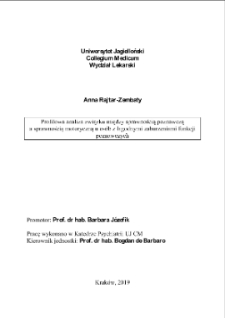Object
Title: Profile analysis of the relationship between cognitiveand motor performance in people with mild cognitive impairment
Abstract:
Introduction: Functional limitations are a serious health and social problem, which concerns elderly people. Their effective prevention and treatment are one of the challenges of modern medicine. The results of previous studies indicate the co-occurrence of motor and cognitive dysfunctions in people with mild cognitive impairment (MCI). In recent years, attention has been drawn to the fact that the slowing down of gait may also precede the deterioration of cognitive function and be an early marker of cognitive dysfunction. However, there is not enough consistent data in the literature to allow the characterization of the relationship between different cognitive domains and motor skills.Aim of the study: The study aimed to assess the relationship between the levels of cognitive and motor skills in people with MCI. It consisted in the analysis of motor skills in a group of people with different cognitive profiles. The relationship between global cognitive and motor functioning was analyzed in two groups of people, with MCI and without MCI. The association of various clinical and demographic factors with cognitive functioning was assessed. The specificity of the relationship between the functioning of individual cognitive domains and motor efficiency were determined in people with various types of MCI.Method: The analysis included 800 participants (653 with normal cognitive functi ; on and 147 people with MCI, from which 88 participants were classified to the amnesic group and 59 to the non-amnesic group). The average age of the study participants was 69,3 years, 71% of them were female, with a minimum of seven years of primary education. The evaluation of the level of depressive symptoms was measured by the Short Form Geriatric Depression Scale. All participants were screened for cognitive functioning using the Mini-Mental State Examination and Addenbrooke's Cognitive Examination-III. Different cognitive domains were evaluated with different neuropsychological tools: the Rey Auditory Verbal Learning test, Clock Drawing test, Verbal Fluency test, Digit Span Test and Trail Making test. To assess functional performance, the Timed Up and Go test as well as the 6 Minute Walk Test were used., Results: The results of the analyzes conducted were presented in three original papers. In the analysis presented in the first study, it was observed that the results of ACE-III, as well as memory subscales and verbal fluency were independently related to the level of motor performance. It was found that global cognitive performance is associated with the level of motor performance in people with MCI. In the second paper, it was proved that the MCI group was different from the control group in terms of age, the level of education and the level of depression symptoms. In ad ; dition, the aMCI group was older and had worse motor performance than the naMCI group. Interestingly, there were no intergroup differences in the incidence of falls and chronic diseases. Logistic regression analysis showed that age, the education level and motor performance are independent predictors for MCI as well as aMCI. In contrast, the only independent factor associated with naMCI was the level of education. In the third article, the results of the analyzes carried out on the whole group showed that almost all domains of cognitive functions (memory, verbal fluency, executive functions, and working memory), as well as the presence of MCI were associated with the level of motor performance. What is more, a relationship was observed between executive functions, verbal fluency, working memory, and motor functioning in the MCI group. It is worthy of note that the conducted interaction analysis showed that the MCI type does not moderate the relationship between cognitive and motor functioning. In the multiple linear regression models calculated for subgroups with different cognitive statuses, independent cognitive predicators of motor performance level were a) executive functions and working memory in the aMCI group, b) letter fluency in the naMCI group, and c) category fluency in the control group.Conclusions: In the light of the research conducted, it can be concluded that ol ; der age and a lower level of education, as well as poorer motor skills are independently related to MCI. Cognitive flexibility, working memory and verbal fluency are associated with the level of motor performance in people with MCI. Executive functions are a very important cognitive component for maintaining motor control. The identification of cognitive dysfunctions is an important element of the diagnostic and therapeutic process. The implementation of comprehensive preventive and rehabilitation interventions will optimize the daily functioning of people with MCI.
Place of publishing:
Level of degree:
Degree discipline:
Degree grantor:
Promoter:
Date issued:
Identifier:
Call number:
Language:
Access rights:
Object collections:
Last modified:
Jun 26, 2023
In our library since:
Aug 11, 2020
Number of object content hits:
51
Number of object content views in PDF format
0
All available object's versions:
http://dl.cm-uj.krakow.pl:8080/publication/4370
Show description in RDF format:
Show description in OAI-PMH format:
| Edition name | Date |
|---|---|
| ZB-131959 | Jun 26, 2023 |
Objects
Similar
Rajtar-Zembaty, Anna
Szot, Paweł
Bober-Płonka, Bogusława
Zielińska, Dorota Anita
Krawczyk-Pasławska, Elżbieta

